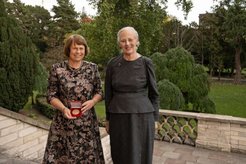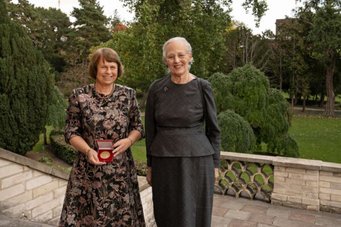Ewine van Dishoeck receives Kavli Prize in Astrophysics

The 2018 Kavli Prize in Astrophysics is given to Ewine van Dishoeck for her seminal work on revealing the chemical and physical processes in interstellar clouds, where stars and planets form. Her work has contributed to a breakthrough of astrochemistry, demonstrating how molecules form and evolve during the transformation of a cloud into stellar systems like our own.
Through observational studies using telescopes on Earth and in space, van Dishoeck unveiled the "water trail,” measuring water vapour from dense clouds to young stars. This helps us understand the formation mechanisms of molecules crucial for life as we know it. She also discovered important structures within the rings of dust and gas surrounding young stars, the birthplace of planets and comets.
Van Dishoeck is professor of molecular astrophysics at the University of Leiden and External Scientific Member at the Max Planck Institute for Extraterrestrial Physics in Garching. She has played a leading role in advancing the field of astrophysics. This includes serving on the board of the internationally-supported Atacama Large Millimeter/submillimeter Array (ALMA) in Chile—a collection of 66 dishes that can be connected to function as one telescope with a diameter of 10 km (6.2 miles). With this exceptional instrument, van Dishoeck and colleagues have studied the formation of solar-type stellar systems within our galaxy.
"Professor Van Dishoeck's research on the chemistry of the universe has transformed virtually every aspect of the subject. She has advanced a subject that was once regarded as a small activity on the fringes of mainstream astrophysics, and brought it to the forefront of astronomy as a whole,” says Robert Kennicutt, member of the astrophysics prize committee.
The Prize consists of a gold medal and a cash prize of USD $1 million for each field. The Norwegian Academy of Science and Letters selected the Laureates, based on nominations by committees whose members are recommended by six of the world’s most renowned science societies and academies. The announcement of the 2018 Laureates was made in Oslo and streamed live to the World Science Festival in New York City.












